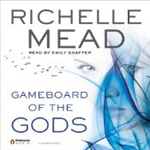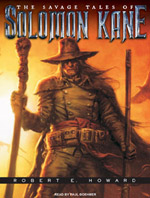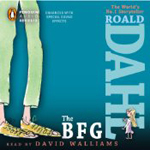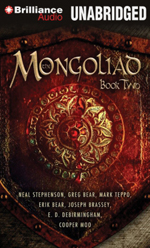
 Gameboard of the Gods (Age of X #1)
Gameboard of the Gods (Age of X #1)
By Richelle Mead; Read by Emily Shaffer
Publisher: Penguin Audio
Publication Date: June 2013
[UNABRIDGED] – 16 hours
Themes: / urban fantasy / ritualistic murder / military /
Publisher summary:
In a futuristic world nearly destroyed by religious extremists, Justin March lives in exile after failing in his job as an investigator of religious groups and supernatural claims. But Justin is given a second chance when Mae Koskinen comes to bring him back to the Republic of United North America (RUNA). Raised in an aristocratic caste, Mae is now a member of the military’s most elite and terrifying tier, a soldier with enhanced reflexes and skills.
When Justin and Mae are assigned to work together to solve a string of ritualistic murders, they soon realize that their discoveries have exposed them to terrible danger. As their investigation races forward, unknown enemies and powers greater than they can imagine are gathering in the shadows, ready to reclaim the world in which humans are merely game pieces on their board.
I listened to Gameboard of the Gods on audio and to me it feels more like science fiction than urban fantasy. The book is a bit hard to review because it kind of evolves as you go a long and I would not want to spoil it for anyone.
The story takes place in the RUNA (Republic of North America) think a future country that is a unified Canada and USA. Dr. Justin March was a servitor who has been exiled to Panama, his citizenship has been taken from him and emotionally he is barely surviving life. Back in the RUNA there is a serial killer who likes to kill on the full moon. Other servitors have been unsuccessful in solving the crimes. Out of desperation Justin’s old employers have come to Panama with Mae and elite soldier with the RUNA to find and bring Justin back to the RUNA with the hope of getting the murders solved. Justin is dying to come home but he decides to get as much out of the deal as possible and he ends up bringing his friends daughter home with him so she can have the chance at a better education. But things don’t go as planned and Justin and Mae find themselves in an almost hopeless situation.
The story is told from three points of view, Justin, Mae and Tessa. Justin and Tessa make total sense you get a feel for two very different sides of the world and you also find out how similar they actually are to one another. I liked both Justin and Mae. Mae is a beautiful killer yet she is still a sensitive soul despite her upbringing – Justin on the other hand is crazy smart, his mind is continuously working so he uses drugs and alcohol to cope and to relax. I did not care for his comfort in using people to meet his ends especially with women and sex. Tessa on the other hand feels like an afterthought – I did like her character but she did not add much to the plot but perhaps in future books she will do something.
A major challenge with this book is you really do not know what is going on until you are about halfway in. Like it took me forever to figure out what the is a servitor?? It took a bit longer to figure out Horatio and Magnus. SO while it works because it made me curious it was also annoying because I never found answers to some questions like what happened to cause the government to sanction religion?? While I would classify this book as sci-fi the world is clearly challenged with technology – so we have a car that can drive itself and a tablet that does it all but other than that it feels kind of like life here in the old USA which rather sucks for sci-fi. Last but not least I would have liked a bit more mythology – we get a glimpse of them with various cults but I think it could have made for an even better story.
As I mentioned I listened to this book on audio, for me a narrator can make or break a book. Emily Shaffer was not a terrible narrator but I do not think she was the best person for this book. Reading a book with so many POV’s means she should have sounded different but to me she always sounds the same. Justin and Mae are rather hardened people they hide who they are from everyone all the time but Emily made them sound so chipper and curious which for me was the opposite of how they were described. My issues with the narration and the lack of world building information made this a slow going audio book.
The book totally has challenges but in the end I still enjoyed the story and I am looking forward to the next one in the series.
Posted by Dawn V.
 Boy: Tales of Childhood
Boy: Tales of Childhood The Poison Belt
The Poison Belt The Savage Tales of Solomon Kane
The Savage Tales of Solomon Kane The BFG
The BFG The Mongoliad Book Two
The Mongoliad Book Two